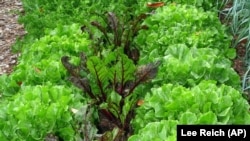Weeds, the fast-growing plants that cannot be eaten and do not bring flowers, are a common problem for gardeners. Some use chemicals to kill weeds. Others pull them up by hand or with heavy machinery. Luckily, there are other ways to limit their growth.
Mulches
For starters, there are mulches which can bury weeds. Mulches are made from organic material, such as leaves, grass cuttings, and small pieces of wood, or inorganic material like plastic. They are spread over the ground in a garden to control weeds.
Organic mulches break down over time so you must add more to your garden often. That is not a bad thing, because their decomposition creates nutrients for plants and humus to keep soils wet and full of fresh air.
Plastic mulch is another way to stop weeds. Common black plastic is easy to lay down. It also effectively blocks weeds and helps soil warm faster in the spring. Recent experiments with other colored plastic have shown effects on both bugs and plant growth. A reflective plastic mulch, for example, keeps some plant-eating insects away.
A major problem with plastic is that it breaks apart over time, so eventually it needs to be thrown away. It also adds nothing to the soil as far as nutrients or humus. And plastic also can block air from reaching the soil.
One kind of mulch that combines some of the qualities of both plastic and organic material is paper. Paper mulch is easy to lay down and eventually decomposes. However, paper adds little to the soil in terms of humus or nutrients.
Birds
For larger gardens where the weeds are mainly grasses, a somewhat unusual way to control them is using the birds known as geese.
Young geese will eat their weight in weeds every day. A small group of geese can clear weeds in half a hectare of land and keep each other company. All you need to provide is water, protection from the sun, and some additional feed. You also need barriers to keep the geese in and other animals out. One warning, though, do not plant corn or they will eat that, too.
Other ways to control weeds
Finally, in addition to direct attacks on weeds, how you plant your garden can indirectly influence weed growth.
For example, close spacing of plants in the garden blocks sunlight from reaching the ground and can limit weed growth. And using a watering method known as drip irrigation will direct small amounts of water to the roots of your plants instead of the weeds.
Whether or not you dig up your soil also influences weed growth. Lying in soil are millions of weed seeds just waiting to be awakened by light and air.
Using any or all of the methods will not permanently stop weed growth. Instead, your goal is simply to limit their growth in the garden.
I’m Pete Musto.
Lee Reich reported on this story for the Associated Press. Pete Musto adapted it for VOA Learning English. Hai Do was the editor.
_______________________________________________________________
Words in This Story
gardener(s) – n. someone who grows and takes care of the plants in a given area of ground
organic – adj. of, relating to, or obtained from living things
decomposition – n. the act of something such as dead plants and the bodies of dead animals slowly being destroyed and broken down by natural processes and chemicals
reflective – adj. causing light, sound, or heat to move away
drip – v. to let small amounts of a liquid fall
irrigation – n. the act of supplying something, such as land, with water by using artificial means, such as pipes
We want to hear from you. Write to us in the Comments Section.





